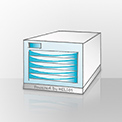HELIOS Tech Info #147
HELIOS services on Debian and Ubuntu servers
HELIOS actively supports and tests the HELIOS services on SUSE Enterprise Linux (SLES) and Red Hat Enterprise Linux (RHEL). But the HELIOS services also run on other Linux distributions.
We collected some requirements and tips for Debian and Debian based distributions (e.g. the Ubuntu LTS versions).
Dependencies and requirements
For running the HELIOS services (up to UB2), the 32bit compatibility libraries are needed.
On most Debian based systems (including Ubuntu) these libraries can be installed issuing the following command:
# apt-get install lib32stdc++6
Also, for running WebShare Web Server and some IndexServer plugins (Office, PDF) a Java runtime is required. OpenJDK is tested and works fine.
Depending on the distribution/version and preference issue the following command to install the OpenJDK runtime:
# apt-get install openjdk-7-jre-headless
or
# apt-get install openjdk-6-jre-headless
The "headless" version will not include GUI elements and will usually, on server systems, have less dependencies than the regular version. This will be sufficient for the HELIOS services, but you may also install the regular version (openjdk-X-jre) or even the full JDK (openjdk-X-jdk). They all work fine.
Boot script
To start up the HELIOS services at system boot, a boot script (“init script”) is needed. For SLES and RHEL the HELIOS installer will automatically install and activate this script under “/etc/init.d”.
For Debian based distributions, which uses other runlevels and a slightly different init script format, the HELIOS boot script must be modified and then installed manually.
An updated boot script is available under:
Username: tools (password: tools)
Sharepoint: “HELIOS Tools”
Folder: “Linux Boot Scripts”
To install the boot script, issue the following command:
# cp /path/to/patched/HELIOS.rc.debian /etc/init.d/HELIOS
To activate it, use the following command:
# update-rc.d HELIOS defaults
If you want to deactivate and remove it later, use:
# update-rc.d HELIOS remove
# rm /etc/init.d/HELIOS
Note: Since the Debian boot scripts do not provide reliable information about when the network is completely ready, the HELIOS services are started with a delay of 10 seconds. If this delay is not sufficient, you may increase it by editing the boot script.

 Enterprise Server
Enterprise Server
 Développeurs / SDK
Développeurs / SDK
 Industrie / Commerce
Industrie / Commerce
 Editeurs de journaux / Maisons d'édition
Editeurs de journaux / Maisons d'édition
 Photographes / Studios
Photographes / Studios
 Agences de communication / publicité
Agences de communication / publicité
 Vidéo & Divertissement
Vidéo & Divertissement
 Collaboration depuis le cloud
Collaboration depuis le cloud
 Couleur HD
Couleur HD
 Traitements d'images
Traitements d'images
 L'épreuvage
L'épreuvage
 Connectivité WebShare
Connectivité WebShare
 Automatisation de flux
Automatisation de flux
 Serveur de fichiers pour l'entreprise
Serveur de fichiers pour l'entreprise
 Communiqués de Presse
Communiqués de Presse Vidéos
Vidéos  Bulletins
Bulletins  Événements
Événements